 |
| Mathieu Amalric |
Fin août, début septembre | Late August, Early September
Arrête ou je continue| If You Don’t, I Will
For the longest time now, I have had a deep fascination with Mathieu Amalric. Despite the obvious, it is not his pleading, desperate eyes that I’m drawn to, although they do often bear the closest resemblance to a man suffering from deep regret or heartbreak (in a Frenchman, that’s kind of appealing...but I guess that says more about me than the actor); instead, my admiration of Amalric is that he is drawn to those melancholic roles that I particularly like. He plays the troubled existentialist well, and that trait coupled with his ease in slipping into those uncharted and uncomfortable zones brings a certain fragility to the surface, a vulnerability which he nonetheless struggles to keep contained; and this mix of ingredients break my heart a little each time he’s on screen.
 |
| Virginie Ledoyen, Mathieu Amalric, Late August, Early September |
From the early days with Assayas in Late August, Early September and André Téchiné in Alice and Martin (1999) (also written by Assayas), Amalric was already on form - naturalistic, earnest, unassuming. However, I found the roles he played in the mid 2000s to be his best: think Desplechin’s Kings and Queens (2004) and A Christmas Tale (2008), Nicolas Klotz’s engrossing Heartbeat Detector (2007), the sensitive and troubled man in L'histoire de Richard O.(2007) and Amalric’s unforgettable Jean-Do, in Julian Schnabel’s The Diving Bell and the Butterfly(2007) based on the titular book by the Elle editor Jean-Dominique Bauby who, after a stroke, was left incapacitated. He suffered from what’s known as the ‘locked-in syndrome’ which meant that although a person’s brain was functioning normally, their body was unable to move, they are physically trapped whilst fully understanding everything around them. For Jean-Do, he was only able to move his left eye and this was how the book was written - a nurse held up and read the alphabet to him, and based on his eye movements, letters were picked up. The slim book was also an engrossing read and I found Amalric’s performance to be phenomenal.
The Diving Bell and the Butterfly
It would be remiss of me to not also mention the brilliant and the darkly comedic Venus in Furs (2014) directed by Polanski, where Amalric is paired again with Emmanuelle Seigner(his former co-star in The Diving Bell and the Butterfly). This is a must-see film and a brilliant two-hander; very much traversing the stage/film divide; fiction and reality; art and real life. I must admit that I’ve followed Amalric’s career closely enough to almost instantaneously recognise his voice in the film Sigmund Freud, un juif sans Dieu (2019), which I had caught on YouTube. You can read my review of this film here.
My fascination with Amalric also extends to his directorial works. Whilst I loved The Blue Room (2016) (and who wouldn’t), is based on Georges Simenon’s novel of the same name, it is his film, Barbara (2016) that revealed him to be a talented director. In this film, Amalric is the director working with an actress, Brigitte, played magnificently by Amalric’s one-time lover, Jeanne Balibar, who is preparing for her role as Barbara, a famous French singer in the 50s and 60s. This re-imagining cleverly embeds the well-used film within film context, but then departs from its confines by narratively weaving in and out of what may be a line or a song within the film’s film, or one that is said or sung, made up by Brigitte; who nonetheless is a total embodiment of Barbara. Blending fictional reality with filmic reality, the audience, rather than being confused by this, get to experience the magic of cinema. Parallel realities co-exist in such a way that, in art, we’re always treading that fine-line between the character we play and the absorption of the ‘self’ into the other. Reality and fictional lives play out in front of us, without boundaries.
Jeanne Balibar as Brigitte, Barbara
In Late August, Early September, we are treated with a young Amalric (Gabriel), a book editor who is post-breakup with his ex-girlfriend, Jenny (Balibar). They are selling their apartment, but this is a mere necessity, a formal conclusion to their relationship; as they seem to recall happier times lived in those small and dingy rooms. In fact, Gabriel is at a crossroads with his career and his new relationship with Anne (played by Virginie Ledoyen). To top this off, his best friend cum mentor, Adrien (François Cluzet) has been diagnosed with a terminal illness.
None of what the quartet experience rests on solid ground, in fact, everything shifts, nothing is permanent, and the transience of friendships, partnerships and even life itself, is lived by its characters in a mature and solemn way. Perhaps the quartet signals the four seasons in a lived life, and that in moving from Summer to Autumn, we are maturing into adulthood. But rather than this transition offering more stability, life is almost always unexpected. Adrien, whose books were deemed by his publisher as incomprehensible or hard to follow (perhaps this is a reflection on life itself) has an insatiable drive to revitalise himself through a string of torrid love affairs, the latest with teenager Véra. Here, we’re treated with a rare glimpse of a gamine Mia Hansen-Løve. She was only 16 when she appeared in this film; and later, she became Assayas’ partner when she turned 21.
François Cluzet and the young Mia Hansen-Løve,
Late August, Early September
The struggle to establish oneself - this transition or metamorphoses is an interior encounter, a skirmish within you - whether you’ll emerge true to your authentic self, or wrapped in society’s confirmation and conformation of you, is what makes the waiting worthwhile. Late August is a film that situates us in this waiting room, where stillness belies the turmoil experienced by those who are caught in this vast expanse of space.
This seemingly modest film is a work of great maturity by Assayas and recalls the films of Claude Sautet as well as Eric Rohmer. We can see this same pace and grace in his later works such as Summer Hours (2008) and Non-Fiction (2018).
Amalric, Emmanuelle Devos, If You Dont, I Will
In Sophie Fillières’ If You Don’t, I Will Amalric’s character is less than likeable. As a married forty-something writer, Pierre is lost in his own world. He is ungrateful, bored and bordering on antagonistic to his wife, Pomme (played by the wonderfully emotive Emmanuelle Devos). Even though they ‘do’ things together, the mundane exercise routines, the hikes, going to a gallery, they are, in fact, apart. They are prickly with each other, playing out on each other’s psychology as many on-screen husbands and wives do, with the ability to press the right button at the right time to induce an expected response. The start is a little claustrophobic. With not much happiness at home, Pomme seeks out her son, Romain, who has moved out and into his own bedsit. Her motherly attempts at filling his fridge with groceries, and gradually getting to know his girlfriend (whose existence she wasn’t even aware of until she chanced there one day) fill her days.
"Together but separate" Amalric, Devos
The couple’s disaccord finally came to a head when, during a hike, Pomme decides to stay in the forest after sending Pierre home. The second part of the film takes on an allegorical journey of discovery. We watch Pomme’s pragmatic behaviour continue, rationing out her food and water (she also had wine, which was deemed to be too warm to drink by Pierre when prepping for the hike), consuming a weird fruit that’s like a custard apple; and then sleeping under a tree and on a log pile. It is when she introduced herself to a stranger (a sort of Park Ranger) as “Gena Rowlands”, that we immediately grasp her meaning. That name conjured up a host of Cassavetes films like A Woman Under the Influence (1974), Faces (1968) and Love Streams (1984). Pomme was the exact opposite of the many characters that Rowlands portrayed; there was no high-drama or spectacle in her life, she was not the one to explode (the champagne bottle did), but yet, the emotional stakes were just as high for her as Rowland’s characters.
"Trapped in a hole" Emmanuelle Devos
The height of this chapter was, when secreted within a small cavern, a goat fell into this dwelling. They spend a night together, the goat calm, but its instincts tell it to continually try to get out. Pomme helps that goat escape its probable fate the next morning, and with that, she herself also exits the forest.
Fillières’ direction and script is naturalistic and her filmic world makes for an immersive experience.
Late August, Early September is currently playing on mubi
If You Don’t, I Will is from N+J’s private collection.

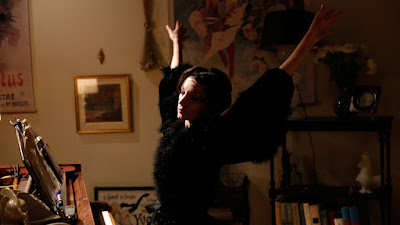
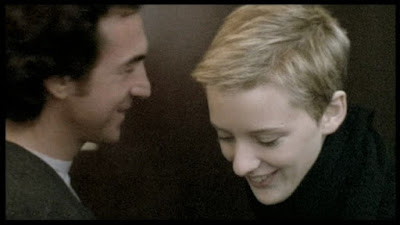
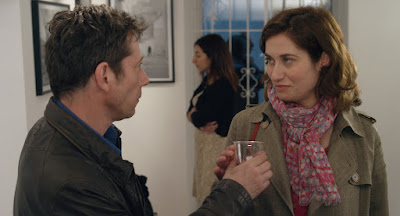
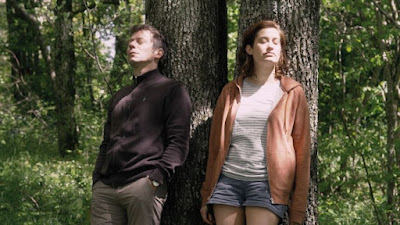
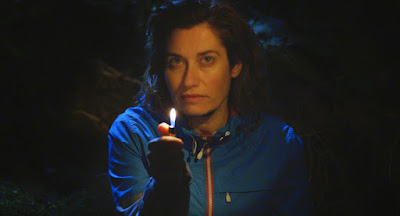
No comments:
Post a Comment
Note: only a member of this blog may post a comment.